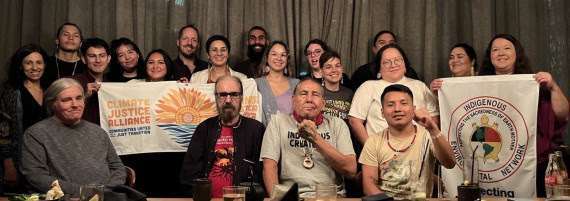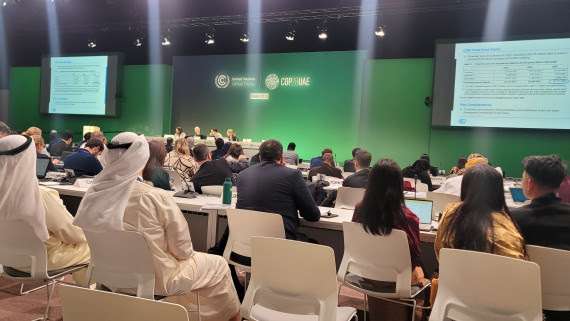Negotiations on “Clean Development Mechanism” language. Photo credit: Climate Justice Alliance
JTA has been engaging in the United Nations Framework Convention on Climate Change (UNFCCC) negotiations process since its inception, when Executive Director Jose Bravo helped to organize the Environmental Justice (EJ) delegation to the 1992 Rio Earth Summit. JTA pushed back against corporate cooptation at the 15th “Conference of the Parties” (COP 15) in Copenhagen, the same year that Hoodwinked in the Hothouse helped shift climate policy debates about “false solutions to climate change.” We led street heat in demanding frontline climate justice solutions at COP 21 in Paris. As the UNFCCC process stumbled backward after the Paris Agreement, JTA advocated for EJ during COP 24 in Katowice, Poland in 2018, and took just transition delegations of communities and workers to COP 26 in Glasgow and COP 27 in Sharm el-Sheikh.
This year Jose attended the mid-year “Intersessional” and, along with numerous allies, demanded that the UNFCCC stop allowing the world’s worst polluters to hijack the process. But we decided to skip COP 28, because after the false solutions festival of COP 27 we felt that this ostensibly multilateral process had become totally broken, dominated and defused by a cabal of powerful states and corporations peddling distractions and dangerous gambles.
The COP process has felt ineffective for a long time, a fact that is especially galling to climate justice activists in the United States because US negotiators have often been the primary obstructionists. This year’s COP 28 took place in Dubai, United Arab Emirates (UAE), an energy-gobbling metropolis in a tiny yet powerful petro-state with a notorious reputation for human rights abuses (invasive surveillance, a complete ban on protest, and only 12% of UAE residents are Emiratis because masses of migrant laborers are employed to build luxurious ultramodern infrastructure while living in brutal bonded-labor conditions). The UAE has obvious incentives to derail any hope for binding agreements that limit the production of fossil fuels, transfer wealth from those most responsible for pollution to those most impacted by it, and encourage real solutions that put power back in the hands of frontline workers and fenceline communities.
Although we did not attend, we observed from afar, and we provided support to our comrades in the It Takes Roots coalition. Indigenous Environmental Network, Indigenous Climate Action, and Climate Justice Alliance did attend, and you can find extensive reporting and resources on their websites. Many other EJ groups decided to boycott COP 28, in protest of the UN’s inability to respond to Israel’s genocide of Palestinians. But at JTA, we had made up our minds a long time ago. Assessing the situation at last year’s COP 27, we predicted that COP 28 would see even more corporate capture. We felt that even with our strenuous efforts and little sleep, our voices loud and proud and our messaging razor sharp, we still could not compete with thousands of fossil fuel lobbyists given access to the backrooms of the UN process.
At time of writing, the negotiations have just now concluded. The assessment seems unanimous – COP 28 is a failure. Very little progress has been made, and the few agreements that have been finalized are vague, unenforceable, and bitterly disappointing to anyone pursuing real climate solutions (they are, on the other hand, very satisfying to elite powerholders seeking to expand their corporate profits and colonial ambitions).
We refuse to give up completely on the UNFCCC. We hold out some hope for a more fair process at COP 30 in Brazil (in 2025 – COP 29 will take place in Azerbaijan, another repressive petro-state). We pledge to continue to build grassroots power, aligning our movements around place-based strategies and solutions to climate chaos, and to continue to align movements at the intersections of labor and environmental justice. We will join our allies in a call for an alternative COP – a “Conference of the People” – to center the wisdom and ideas of those most impacted to lead us through this pervasive, complex ecological crisis. Collaborative bottom-up decision-making, real participatory democracy, is integral to all of the profound systemic changes needed to respond to these unprecedented challenges.
Please help us to move together toward a Conference of the People. Stay tuned for more updates about organizing endeavors, and continue to lean into the vitally important grassroots power-building campaigns in your workplaces and communities.
For more in-depth analysis and day-by-day reporting on COP 28, please see Indigenous Environmental Network, Indigenous Climate Action, and Climate Justice Alliance websites.

Delegates from Climate Justice Alliance, Indigenous Environmental Network, and Indigenous Climate Action. Photo credit: Climate Justice Alliance

